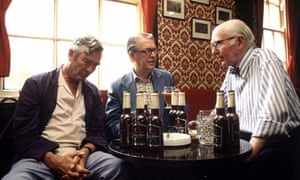MAN BOOKER PRIZE 1986
Booker club: The Old Devils
by Kingsley Amis
Kingsley Amis's 1986 Booker winner shows an unexpectedly sweet side of a writer often accused of misogyny and bitterness
Sam Jordison
Tue 16 Feb 2010
Viewed through the reverse telescope of history, Kingsley Amis's success at the 1986 Booker prize seems like the natural culmination of a long and distinguished writing career. One of the finest comic writers of his generation – century even – had done the natural thing and written a bloody brilliant book that easily scooped the country's top literary award.
At the time, however, it came as something of a surprise. There are notable similarities between the way Amis Snr was regarded then and his son Martinis now. Kingsley was widely seen as past his best before The Old Devils came out and more column inches were devoted to denunciations of what commentators imagined he thought than to the words he wrote. Unlike Martin, he also had the disadvantage of being a well-known drunk and (to paraphrase Christopher Hitchens) the booze was beginning to get to him and rob him of his wit and charm. Few expected the Old Devils to be as good as it was – but that just makes it all the sweeter.
"Sweet" is in fact the operative word here. Another surprise from a man so frequently accused of misogyny and bitterness is just how tender this book is – and how in love with love.
The Old Devils of the title are old friends from Wales. Because they are mainly retired, their day starts winding down shortly after breakfast and so they start drinking. The men imbibe dangerous amounts in various unpleasant pubs, the women in various unpleasant kitchens. They bitch and moan and say outrageously rude things about anything and everybody, but – crucially – they all tolerate each other. They even put up with a chronic alcoholic called Dorothy. They just desperately try to keep talking whenever she's around so she isn't able to cut in with one of her interminable monologues about New Zealand tribal customs. (A task that is described with typical virtuosity as being "like trying to start a motorcycle in the path of a charging elephant.")
What's more, over the course of the book, they find a way to forgive each other's past transgressions, admit to past cruelties and even rekindle snuffed-out love affairs. Their memories about their shared experiences have become unreliable, they don't all have their own teeth and at least one of them has become convinced he is too fat and hideous to ever bother about again – but human warmth wins through. It's moving and life-affirming – all the more so thanks to Amis's frankness about the infirmity and imminent death faced by most of his characters.
But that's not to say the old rogue has gone soft. The novel is also satire of the highest quality. One of the main story strands, for instance, follows professional Welshman Alun (born Alan) Weaver and his return to "this land of river and hill" from a successful career he has carved out in London by banging on about his affinity to "Brydan" (a thinly disguised stand-in for Dylan Thomas). Cue countless barbed riffs on Pays-De-Gallic posturing. "If you ask me all the proper Welshman are leaving Wales," someone remarks. "I say, are they really? Well that's splendid news, by George," comes the reply. Most blunt (and wonderful) is the invitation: "Show me a Welsh nationalist and I'll show you a cunt."
There are also fine evocations of the thousand daily pinpricks of existence in the UK; of suburban ennui and its bored love affairs, of the indignities of age, of hopeless drunks, and of hideous modernised pubs and even worse untouched ones. The temptation here is to start reeling off supporting quotes again, especially some beauties relating to bowel movements and farting. The trouble is that quoting Amis never does him real justice. His comic genius relies so much upon build-up, context and impeccable timing that it can only be fully appreciated in its correct setting. You'll just have to take my word for it that I was laughing so much that I was frequently unable to continue reading. Or, better still, get hold of the book yourself. It's that rare and precious thing – a novel that is a delight from start to finish.





No comments:
Post a Comment